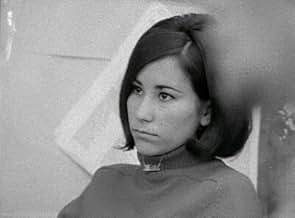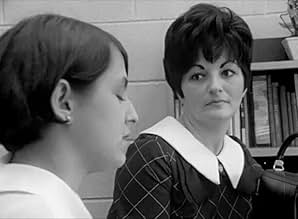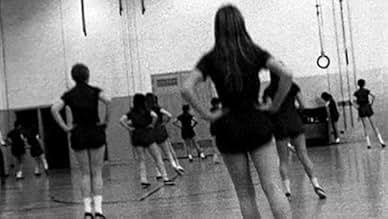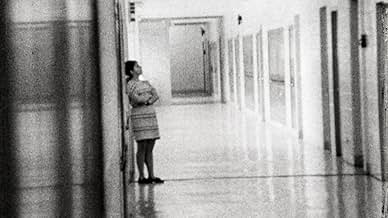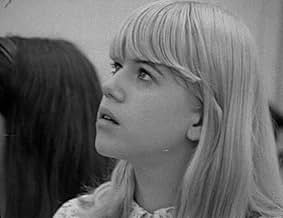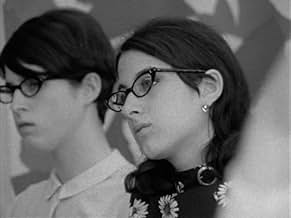VALUTAZIONE IMDb
7,5/10
2400
LA TUA VALUTAZIONE
Aggiungi una trama nella tua linguaDocumentary filmmaker Frederick Wiseman takes us inside Northeast High School as a fly on the wall to observe the teachers and how they interact with the students.Documentary filmmaker Frederick Wiseman takes us inside Northeast High School as a fly on the wall to observe the teachers and how they interact with the students.Documentary filmmaker Frederick Wiseman takes us inside Northeast High School as a fly on the wall to observe the teachers and how they interact with the students.
- Regia
- Premi
- 1 vittoria in totale
Recensioni in evidenza
I attended Northeast High School shortly after the movie was filmed. It is a disturbingly accurate presentation. Mr. Wiseman's cinema verite approach has encapsulated that time and space in the way to which historical endeavors aspire, but rarely achieve. The black and white format, while most likely driven by technology and cost, perfectly underscores the bland, but far from sterile, environment. While no accounting, regardless of volume, objectivity or technical accuracy, can fully convey an experience, this film merits its standing as an excellent historical work.
I remember the staff and how they made me feel. From comments I have read here and elsewhere, the movie provides the right mix of raw material for the audience to experience what I did. Or, if they "just don't get it," like the staff at the school, they will see what the staff did when the movie was made. Only after viewers expressed what they saw did the cast become incensed with what they later recalled as deceptive, malicious, slanderous abuses of trust. One teacher remarked to my class that the cameras were equipped with secret mirrors, so they could surreptitiously capture other than what they appeared to be filming. The movie was banned from Philadelphia for a number of years. This was during the Cold War. I remember wondering if people in the Soviet Union were allowed to watch it, and if I would be arrested should I smuggle it into the city.
With pathetically few exceptions, the teachers and administrators were generally condescending, arbitrarily authoritative, and guided by their own biases. They cared little for the students as learners or human beings, were poorly qualified to communicate, let alone teach, and were surprisingly more ignorant of current events than most of the students.
There was one notable exception, and I wish Mr. Wiseman could have found a way to weave it into the film's cloth without betraying its honesty.
The dean of students, figuring prominently in the movie, known as "The Mean Dean" in my day, taught my 12th grade history class. I was fortunate not to have known him in the more familiar context. At least that's what my memory tells me. With his Frank Rizzo haircut, overwhelming physical presence, brutal manner of speech, and distinctive gait owing to severe WW2 injuries, he contrasted with all of the other social sciences teachers in every way.
At the start of the school year, he explained that his â?odeanâ? alter ego would never enter the classroom and he held to that. He was honest about his opinions, never declining a straight question. He admitted what he didn't know or understand, and welcomed input from the class. He proudly related how the GI Bill allowed him to make a good life after his horrible experience in the war, his Corvette indulgence that was not popular with staff, and an almost childlike fascination with the complexity of the world. His unambiguous goal was to encourage the students to be skeptical of news and politics, to collect information from many sources, and to analyze and draw their own conclusions. It was one of the only classes in which we were taught to think for ourselves. The only textbook was a mandatory subscription to the Sunday New York Times, which we were required to read. Class assignments consisted of our comments and analyses of articles and editorials. Grading was based entirely on quality of the analysis. He was excruciatingly critical of process, and completely oblivious to content. I donâ?Tt know how he felt about the late Justice, but for me William Brennan and my 12th grade history teacher are my two First Amendment icons. I agreed with almost none of his very clearly expressed opinions. Still, I remember this as the most liberal of any class in my public school education.
There was one other notable exception to the gray abyss of high school. The SPARC extracurricular program, and its associated magnet program curriculum for the tiny clique of "advanced placement" students, was one bright spot in the school district's otherwise unenviable history. But it was so academically and physically isolated from the school mainstream, I don't see how it could have been accurately integrated into this movie. The shame is that the excellent teachers and equipment afforded by the program were not available to the large majority of students.
The reading of the soldier's letter was a perfect closing, as it so perfectly distilled the utter ignorance of that generation of teachers and administrators. There has been some progress in the intervening 30+ years, but there has also been some backsliding. "High School" remains, sadly, a timely insight into the education system in this country.
I remember the staff and how they made me feel. From comments I have read here and elsewhere, the movie provides the right mix of raw material for the audience to experience what I did. Or, if they "just don't get it," like the staff at the school, they will see what the staff did when the movie was made. Only after viewers expressed what they saw did the cast become incensed with what they later recalled as deceptive, malicious, slanderous abuses of trust. One teacher remarked to my class that the cameras were equipped with secret mirrors, so they could surreptitiously capture other than what they appeared to be filming. The movie was banned from Philadelphia for a number of years. This was during the Cold War. I remember wondering if people in the Soviet Union were allowed to watch it, and if I would be arrested should I smuggle it into the city.
With pathetically few exceptions, the teachers and administrators were generally condescending, arbitrarily authoritative, and guided by their own biases. They cared little for the students as learners or human beings, were poorly qualified to communicate, let alone teach, and were surprisingly more ignorant of current events than most of the students.
There was one notable exception, and I wish Mr. Wiseman could have found a way to weave it into the film's cloth without betraying its honesty.
The dean of students, figuring prominently in the movie, known as "The Mean Dean" in my day, taught my 12th grade history class. I was fortunate not to have known him in the more familiar context. At least that's what my memory tells me. With his Frank Rizzo haircut, overwhelming physical presence, brutal manner of speech, and distinctive gait owing to severe WW2 injuries, he contrasted with all of the other social sciences teachers in every way.
At the start of the school year, he explained that his â?odeanâ? alter ego would never enter the classroom and he held to that. He was honest about his opinions, never declining a straight question. He admitted what he didn't know or understand, and welcomed input from the class. He proudly related how the GI Bill allowed him to make a good life after his horrible experience in the war, his Corvette indulgence that was not popular with staff, and an almost childlike fascination with the complexity of the world. His unambiguous goal was to encourage the students to be skeptical of news and politics, to collect information from many sources, and to analyze and draw their own conclusions. It was one of the only classes in which we were taught to think for ourselves. The only textbook was a mandatory subscription to the Sunday New York Times, which we were required to read. Class assignments consisted of our comments and analyses of articles and editorials. Grading was based entirely on quality of the analysis. He was excruciatingly critical of process, and completely oblivious to content. I donâ?Tt know how he felt about the late Justice, but for me William Brennan and my 12th grade history teacher are my two First Amendment icons. I agreed with almost none of his very clearly expressed opinions. Still, I remember this as the most liberal of any class in my public school education.
There was one other notable exception to the gray abyss of high school. The SPARC extracurricular program, and its associated magnet program curriculum for the tiny clique of "advanced placement" students, was one bright spot in the school district's otherwise unenviable history. But it was so academically and physically isolated from the school mainstream, I don't see how it could have been accurately integrated into this movie. The shame is that the excellent teachers and equipment afforded by the program were not available to the large majority of students.
The reading of the soldier's letter was a perfect closing, as it so perfectly distilled the utter ignorance of that generation of teachers and administrators. There has been some progress in the intervening 30+ years, but there has also been some backsliding. "High School" remains, sadly, a timely insight into the education system in this country.
Sometimes the best films are those truest to themselves. There's nothing phony about this movie. It's a time capsule. It captured a cloistered, closed system from within. The results are spellbinding.
The faculty of NorthEast high school in Philadelphia are the stars. The viewer decides whether their actions are good or bad. There's certain purity at work. Is it an imperfect system? You bet it is. Do rules appear petty and draconian? Yes, they do. But there is hope inside the bubble. The faculty at NorthEast could be teachers at my high school. We have the flat-topped disciplinarian, the hip, young English teacher, the no-nonsense fashion matron, and the boring instructor with the bad teeth.
The scene with the coach and the graduate who visited while on leave from Vietnam illustrated one of the prominent themes; this environment is in a bubble insulated from community and society. In this scene, the coach made a connection between a soldier's war wound and the effect on his sports career. He was so wrapped up in his role as the school coach; he immediately applied news from the outside world to his microcosmic world inside the school grounds.
This theme was also reiterated by a boy in one of the rare scenes where students were the stars. The would-be bohemian said as much; this school is a cloistered, closed system. The bubble theme is further underscored by the sequence where three boys emerged from a space capsule simulator after 193 hours. There was much fanfare for the successful end to 'Project SPARC' including a telegram from astronaut Gordon Cooper, read with typical dragnet-style inflection by the sponsoring teacher.
In fact, several scenes feature extended recitations of written material by instructors who suffer from chronic educational ennui. There is the flat rendition of 'Casey at the Bat', the review of the typing test text, and the dreaded retelling of the "thought for the day" from the daily bulletin. A glimpse of self-awareness offered by a young English teacher was most startling. In the course of dissecting Paul Simon's poem "The Dangling Conversation", she read it aloud first, and followed with the Simon & Garfunkel song version. She told the students to listen to both versions. The poem came alive with the music. A lingering shot of the teacher showed the hope in her eyes that someone will get the message. For me, it's the best sequence in the film. If Wiseman wanted to underscore a failure of the system, it lied not with the disciplinarian tactics or heavy-handed advice dispensed by the staff, but with the inadequacy of the delivery methods used by educators.
The message turns hopeful in the last scene. A teacher reads a letter at a faculty meeting written by the former student on station in Vietnam. Tight camera work reveals the emotion of the reader, in contrast to the non expressive faces of the previous speakers. The written word provides power after all. There's hope on the part of the student to survive outside the system, hope on the part of the administrator reading the note that they do have an impact on their charges, and hope that inside a flawed machine such as the educational system, someone gets the message.
The faculty of NorthEast high school in Philadelphia are the stars. The viewer decides whether their actions are good or bad. There's certain purity at work. Is it an imperfect system? You bet it is. Do rules appear petty and draconian? Yes, they do. But there is hope inside the bubble. The faculty at NorthEast could be teachers at my high school. We have the flat-topped disciplinarian, the hip, young English teacher, the no-nonsense fashion matron, and the boring instructor with the bad teeth.
The scene with the coach and the graduate who visited while on leave from Vietnam illustrated one of the prominent themes; this environment is in a bubble insulated from community and society. In this scene, the coach made a connection between a soldier's war wound and the effect on his sports career. He was so wrapped up in his role as the school coach; he immediately applied news from the outside world to his microcosmic world inside the school grounds.
This theme was also reiterated by a boy in one of the rare scenes where students were the stars. The would-be bohemian said as much; this school is a cloistered, closed system. The bubble theme is further underscored by the sequence where three boys emerged from a space capsule simulator after 193 hours. There was much fanfare for the successful end to 'Project SPARC' including a telegram from astronaut Gordon Cooper, read with typical dragnet-style inflection by the sponsoring teacher.
In fact, several scenes feature extended recitations of written material by instructors who suffer from chronic educational ennui. There is the flat rendition of 'Casey at the Bat', the review of the typing test text, and the dreaded retelling of the "thought for the day" from the daily bulletin. A glimpse of self-awareness offered by a young English teacher was most startling. In the course of dissecting Paul Simon's poem "The Dangling Conversation", she read it aloud first, and followed with the Simon & Garfunkel song version. She told the students to listen to both versions. The poem came alive with the music. A lingering shot of the teacher showed the hope in her eyes that someone will get the message. For me, it's the best sequence in the film. If Wiseman wanted to underscore a failure of the system, it lied not with the disciplinarian tactics or heavy-handed advice dispensed by the staff, but with the inadequacy of the delivery methods used by educators.
The message turns hopeful in the last scene. A teacher reads a letter at a faculty meeting written by the former student on station in Vietnam. Tight camera work reveals the emotion of the reader, in contrast to the non expressive faces of the previous speakers. The written word provides power after all. There's hope on the part of the student to survive outside the system, hope on the part of the administrator reading the note that they do have an impact on their charges, and hope that inside a flawed machine such as the educational system, someone gets the message.
I love this film. It really makes you think about how high schoolers are oppressed. I love the style of this film because it has no narrative, just shots from a high school. There is no one telling you what to think or what is going on. Therefore you are forced to think for yourself about what is going on. It is very interesting to hear the reactions of teachers and students after viewing this film, as they have different interpretations.
There are a few scenes that really stand out to me. The main one being the last scene. The woman who reads the letter from the ex-student who is now in Vietnam stressed how "successful" this school has been in creating such a great student. The former student had written her a letter thatn basically stated that he no longer thinks of himself as a person, but as a body. He is humbled by his country and he will blindly obey his orders in the service. He wants his insurance money to go to the school if he gets killed in combat. It is the least he do for a school that taught him such strict discipline - so much discipline that he no longer thinks of himself as a human being with feelings!! That is what I got out of it, at least. It's a great punchline.
I would also like to comment on the closeups of the girls butts in the gym. I did not interpret this as some sexist filmmakers getting their kicks by watching the girls jump around in short shorts. I thought it was more of an ironic connection between the girl that was reprimanded at the prom for having such a short skirt. It was also a connection between the fashion show and the teacher who was trying to teach girls how to be ladylike in a very blunt and insulting manner. The school is forcing the girls to wear these ridiculous gym outfits that have very short shorts. Then they force the girls to play ridiculous games and do stupid excersizes. I think it shows how sexist the high school was, rather than the filmmakers. It made the girls all look like objects, which is exactly what the high school was practicing.
I thought it was really great how Wiseman included the entire reading of Casey at The Bat. The viewer most likely does not want to hear the teacher read this whole thing, yet we are forced to hear the whole poem read, quite dully. This shows how DULL and dehumanizing high school can be. The viewers are feeling exactly the same feelings the students must have been feeling at the time. We don't want to hear the poem, neither do the students. Yet this is the beauty and absurdity of these high school rituals.
I also liked the Spanish class in which the students are repeating the Spanish word for existentialism, and other philosophies. It is very ironic that the students are in this oppressive institution and brainlessly being forced to repeat these philosophies that preach the exact opposite.
The girl who gets defenisve about being too individualistic is also ironic. She swears her short skirt was not trying to make her "an individual", as if that was a bad thing.
It is so interesting to see how different the generational views are. One student is claiming he is "being a man" by standing up for what he believes in when being wrongly accused of acting up in class, while the vice principal says in order for him to "be a man" he must follow orders and swallow his pride. Such different views about manliness!
I could go on and on, but I will not. This is a great film. High schoolers today should watch this film, as well as "No Reason to Stay", another anti-high school film from the 60's. It will re-enforce their gut feelings that high school really does suck.
There are a few scenes that really stand out to me. The main one being the last scene. The woman who reads the letter from the ex-student who is now in Vietnam stressed how "successful" this school has been in creating such a great student. The former student had written her a letter thatn basically stated that he no longer thinks of himself as a person, but as a body. He is humbled by his country and he will blindly obey his orders in the service. He wants his insurance money to go to the school if he gets killed in combat. It is the least he do for a school that taught him such strict discipline - so much discipline that he no longer thinks of himself as a human being with feelings!! That is what I got out of it, at least. It's a great punchline.
I would also like to comment on the closeups of the girls butts in the gym. I did not interpret this as some sexist filmmakers getting their kicks by watching the girls jump around in short shorts. I thought it was more of an ironic connection between the girl that was reprimanded at the prom for having such a short skirt. It was also a connection between the fashion show and the teacher who was trying to teach girls how to be ladylike in a very blunt and insulting manner. The school is forcing the girls to wear these ridiculous gym outfits that have very short shorts. Then they force the girls to play ridiculous games and do stupid excersizes. I think it shows how sexist the high school was, rather than the filmmakers. It made the girls all look like objects, which is exactly what the high school was practicing.
I thought it was really great how Wiseman included the entire reading of Casey at The Bat. The viewer most likely does not want to hear the teacher read this whole thing, yet we are forced to hear the whole poem read, quite dully. This shows how DULL and dehumanizing high school can be. The viewers are feeling exactly the same feelings the students must have been feeling at the time. We don't want to hear the poem, neither do the students. Yet this is the beauty and absurdity of these high school rituals.
I also liked the Spanish class in which the students are repeating the Spanish word for existentialism, and other philosophies. It is very ironic that the students are in this oppressive institution and brainlessly being forced to repeat these philosophies that preach the exact opposite.
The girl who gets defenisve about being too individualistic is also ironic. She swears her short skirt was not trying to make her "an individual", as if that was a bad thing.
It is so interesting to see how different the generational views are. One student is claiming he is "being a man" by standing up for what he believes in when being wrongly accused of acting up in class, while the vice principal says in order for him to "be a man" he must follow orders and swallow his pride. Such different views about manliness!
I could go on and on, but I will not. This is a great film. High schoolers today should watch this film, as well as "No Reason to Stay", another anti-high school film from the 60's. It will re-enforce their gut feelings that high school really does suck.
I just tripped over this review and was brought back by the comment from geprescott in 2003. I was also a student at Northeast High School, graduating in 1970.
What I do remember about the pieces I saw was they were real but not quite true. These are images from long ago, but there was something of the fact that most teachers were trying and not intending to be caricatures as I remember them appearing in the film.
What really got me to write was the description of the disciplinarian dean. I also had him as a 12th grade history teacher. Everything said about him by geprescott was very accurate. Our class was not required to read the Sunday New York Times, but I remember the year long project was to choose a country, research it, and then write its foreign policy. I picked the Soviet Union, did my research, and wrote a paper aimed at making life as difficult as possible for the US. I don't remember the actual comments but I remember being pleased with the final grade.
I never saw this entire film and am not sure where to find it now. I'd like to watch it with my kids.
What I do remember about the pieces I saw was they were real but not quite true. These are images from long ago, but there was something of the fact that most teachers were trying and not intending to be caricatures as I remember them appearing in the film.
What really got me to write was the description of the disciplinarian dean. I also had him as a 12th grade history teacher. Everything said about him by geprescott was very accurate. Our class was not required to read the Sunday New York Times, but I remember the year long project was to choose a country, research it, and then write its foreign policy. I picked the Soviet Union, did my research, and wrote a paper aimed at making life as difficult as possible for the US. I don't remember the actual comments but I remember being pleased with the final grade.
I never saw this entire film and am not sure where to find it now. I'd like to watch it with my kids.
"High School" is enthralling in one sense; if you are obsessed with the mundane "American Splendor" of generations past, then you will adore this documentary. For its time, it was brilliantly avant garde and remains so even today for its muted commentary on administration and the growing disparity between older generations and the younger high schoolers of the late 60's.
There is something purely amazing in viewing such settings in this vignette as they were, undoctored by Hollywood's lens. I am fascinated by the details of a time that I will never know personally and "High School" provides a brief glimpse into the mindset of the young adults of 1969 who are not unlike ourselves.
If you dig documentaries, please give this one a shot. Maybe you'll become as obsessed with "High School" as I have.
There is something purely amazing in viewing such settings in this vignette as they were, undoctored by Hollywood's lens. I am fascinated by the details of a time that I will never know personally and "High School" provides a brief glimpse into the mindset of the young adults of 1969 who are not unlike ourselves.
If you dig documentaries, please give this one a shot. Maybe you'll become as obsessed with "High School" as I have.
Lo sapevi?
- QuizThis film was selected to the National Film Registry, Library of Congress, in 1991.
- Citazioni
Male Authority Figure: It's nice to be individualistic, but there are certain places to be individualistic.
Female Student: I didn't mean to be individualistic.
Male Authority Figure: No, I'm not criticizing!
- ConnessioniFollowed by High School II (1994)
- Colonne sonore(Sittin' On) The Dock of the Bay
(uncredited)
Written by Steve Cropper and Otis Redding
Performed by Otis Redding
I più visti
Accedi per valutare e creare un elenco di titoli salvati per ottenere consigli personalizzati
- How long is High School?Powered by Alexa
Dettagli
- Data di uscita
- Paese di origine
- Siti ufficiali
- Lingue
- Celebre anche come
- Student Affairs
- Luoghi delle riprese
- Azienda produttrice
- Vedi altri crediti dell’azienda su IMDbPro
- Tempo di esecuzione1 ora 15 minuti
- Colore
- Mix di suoni
Contribuisci a questa pagina
Suggerisci una modifica o aggiungi i contenuti mancanti

Divario superiore
By what name was High School (1968) officially released in Canada in English?
Rispondi
